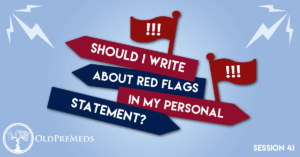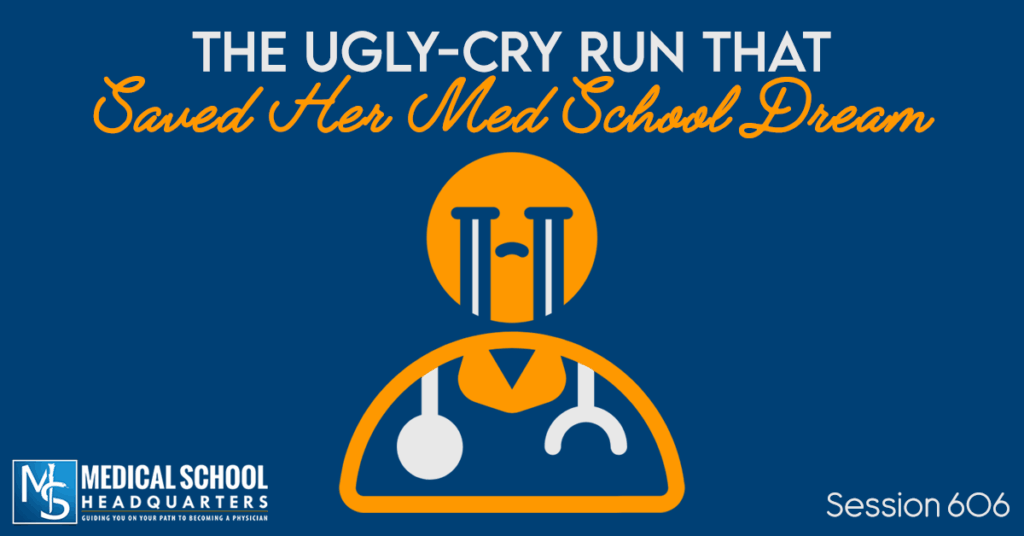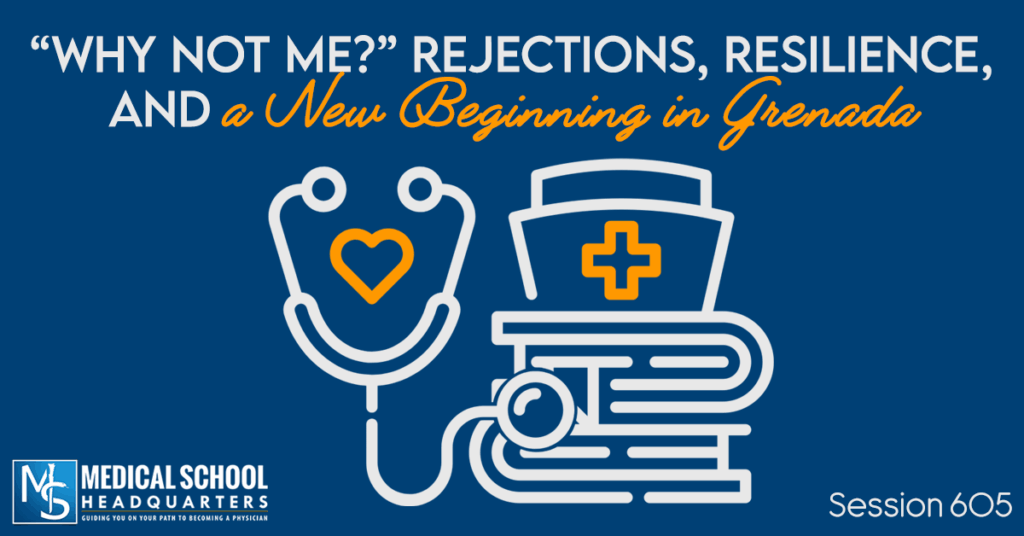Session 41
In this episode, Ryan tackles a question about personal statement specifically about whether or not you should mention red flags in your personal statement. Is it safe to mention that you’ve been partying too much? Listen in to know more about Ryan’s take on this.
Each week, Ryan pulls out a question directly from the OldPreMeds.org forum and answers it here on the podcast. If you haven’t yet, join the positive and collaborative community of nontraditional premed and medical students by signing up at the OldPreMeds.org.
OldPreMeds Question of the Week:
Poster is currently writing his personal statement and has seen from different sources that red flags should be brought up in the application. His first two years were not good years academically and wanted to talk about it. If he did bring it up, should he say that he was getting lost partying too much over those first two years or should he give a vague reasoning?
Here are the insights from Ryan:
Should red flags be mentioned in your personal statement?
Yes and no.
Two important analogy questions to consider:
- What was it that planted the seed in your head to become a physician?
- What experiences watered that seed?
Do you mention too much partying in a personal statement?
No. Partying too much can be too much of a negative and plays too much into your personality of not caring too much and picking one thing over the other.
What can you mention in a personal statement?
Here’s an example:
Even though you got off to a slow start academically, you have course corrected and showed your strength as a student in the last two years and during your postbac.
- Write it down in one or two sentences.
- Just lay a little hint that something happened and then move on.
- Once you’re there for the interview then you can explain things in more depth.
Major takeaway from this episode:
The goal of your personal statement is to lay down why you want to be a physician, what experiences have you had that have strengthened that desire. Do not dive too much into red flags as they’re a waste of space and the admissions committee would not want to hear about those at this point.
Links and Other Resources:
Listen to The Premed Years Podcast Session 161: 5 Biggest Medical School Personal Statement Mistakes
Podcast Addict app on Android
Stitcher app on Windows
Transcript
Introduction
Dr. Ryan Gray: The Old Premeds Podcast is part of the Med Ed Media network at www.MedEdMedia.com.
This is the Old Premeds Podcast, session number 41.
You’re a nontraditional student entering the medical field on your terms. You may have had some hiccups along the way, but now you’re now ready to change course and go back and serve others as a physician. This podcast is here to help answer your questions and help educate you on your nontraditional journey to becoming a physician.
Taken directly from the forums over at www.OldPremeds.org, we answer a new question here every week at the Old Premeds Podcast. If you’re unfamiliar with www.OldPremeds.org I highly recommend you run over there right now and sign up. That is unless you are driving, don’t sign up then, wait until you’re stopped at a red light.
Alright the question this week is an interesting one. We covered a few weeks ago the personal statement, and what nontrads should cover in the personal statement. And this week is very similar. Not similar as far as what to cover, but similar as far as a personal statement question, so let’s go ahead and read it.
Red Flags in the Personal Statement
We have a post here that says, ‘I’m currently writing my personal statement and I’ve seen from different sources that you should bring up any red flags that are on your application. My first two years were not good years academically and I want to talk about it. If I do bring it up should I say that I specifically think that it was going- that it was getting lost in partying too much over those first two years. Or should I say a more vague reasoning?’
Alright so partying or not partying, that is the question. So red flags. Red flags in a personal statement is a very common question. Should you write about red flags in your personal statement? Good question, popular question, and my answer is yes and no. ‘Yes and no’ is very vague, I know, let me expand on that. The personal statement is there so that when I’m done reading your personal statement, I know why you want to be a physician. I understand your motivations to becoming a physician. I understand your experiences that you had that have cultivated that desire to become a physician. I was talking to a student the other day during a mock interview and I used the term, ‘What was it that planted the seed in your head to become a physician? And then what experiences watered that seed?’ And I think really that’s the best kind of analogy or way that I’ve ever said that, and so I wanted to mention it here today. What planted the seed, and then what watered the seed? A lot of students have red flags in their applications, like this poster’s application. He had a couple years of partying too much over the first two years of his education, not uncommon. Do you mention that in a personal statement though? And I would say no. What you can mention is that- somewhere near the end as you’re wrapping up your application, and you’re talking about your desires to be a physician, maybe where you see yourself using your medical education, you can mention the fact that, ‘Even though I got off to a slow start academically, I believe that I course corrected and was able to show my strength as a student the last two years and during my postbac.’ One quick sentence or two sentences and it wraps it up in a little bow, and what you’re doing is you’re putting a little nugget in there so that the interviewer, if they have access to your personal statement and they actually read your personal statement, because those things are two different things. Even though they have access to it doesn’t mean they’ve read it. If they’ve read it and they want to ask you a question about that statement, and you said that you got off to a slow start, then they could say, ‘Tell me about this slow start that you mention here,’ then you can dive into it. And I wouldn’t talk about partying too much. I think that’s too much of a negative, it plays too much into your personality of really not caring too much and picking one thing over the other. I think there are many other ways of describing that without saying that you partied too much. So that’s kind of just an aside.
But with those red flags, that’s really all you need to do is just lay that little hint there that something happened, and then move on. Really the goal of your personal statement- again, why do you want to be a physician? What experiences have you had that have strengthened that desire? Red flags you don’t want to dive in too much. That’s a waste of space, and I don’t want to hear it really at this point. Your goal with the personal statement, help me understand why you want to be a physician, make me want to interview you. That’s your goal. Once you’re there for the interview, then you can explain things in more depth and as much you think you need to or want to.
So I hope that helps answer your question. Should you put red flags in your personal statement? That is the question.
Final Thoughts
Alright we have a ton of great episodes on personal statements over at The Premeds Years. If you haven’t listened to that podcast, that’s my main podcast. It released episode 201 today, we broke 200 episodes last week. At this point probably as you’re listening to this, that podcast has over one million downloads which is crazy in my head. To give you an idea, the Old Premed Podcast has I think 50,000 at this point. So off to a good start, I think it’s still way ahead of where The Premed Years Podcast was at this point a long time ago. So thank you for taking this journey with me every week. If you’re not joining me every week, I highly recommend you do, and the best way to do that is by subscribing in your podcast player of choice. They are free. If you have an iOS device, Apple gives you the podcast app which you can subscribe to this podcast and all of the podcast that we release here at Med Ed Media. Just search for Med Ed Media, it’s the easiest way to do things now. If you are on an Android device, there are a ton of podcast applications; there’s Stitcher, there’s Google Play Music now covers podcasts on an Android device, although it doesn’t cover the whole back catalog of The Premed Years. It only holds I think 100 podcast episodes, so if you want to go back and listen to all of The Premed Years, which you’d be surprised, a lot of people do that, then a different app is more likely the best for you. And usually the best app- a lot of people love I think it’s called Podcast Addict on an Android device. So lots of ways to listen. On a Windows phone, if you’re on one of those, I think they have Stitcher on Windows maybe. If you’re on a Windows phone, get an Android device is my best bet. That’s my advice for you.
Anyway I hope this week’s podcast helped you if you’re struggling writing about the personal statement, or writing about red flags in your personal statement, and that’s about it. Oh I didn’t mention The Premed Years, episode 161 is a good one to listen to for personal statement advice.
I hope you got a ton of great information out of the podcast today, and as always I hope you join us next week here at the Old Premeds Podcast, and Med Ed Media, and Medical School Headquarters, and whatever funky names I can add on to the end.







